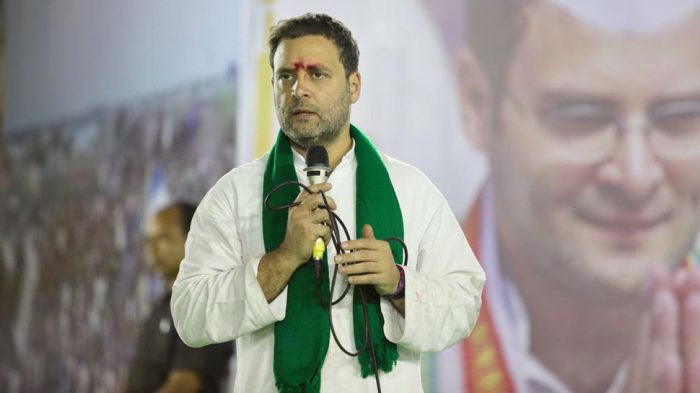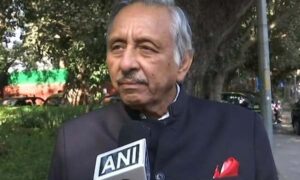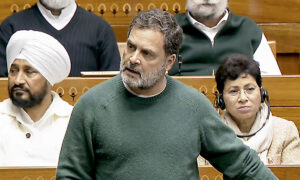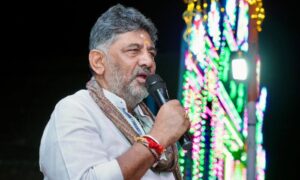
Picture Courtesy : Zee News
Continuing to target the Prime Minister in his campaign in poll-bound Karnataka, Congress president Rahul Gandhi asked why Narendra Modi, who had described himself as the country’s “chowkidar”, was “silent” on the PNB fraud.
He also asked Modi as to why he was not taking any action regarding the alleged sudden increase in turnover of a company owned by BJP president Amit Shah’s son Jay Shah.
“Modi ji comes to Karnataka and speaks about corruption. He had told the country not to make him Prime Minister but make him the chowkidar (watchman) of the country,” he said at party rallies in Vijapura and Bagalkote districts in north Karnataka. Gandhi said, “On one side there is his party’s (former) chief minister (B S Yeddyurappa) who had gone to jail and on the other side are the other four former ministers of the BJP government who had gone to jail; sitting in between them, Modi speaks about corruption.”
Gandhi is on the second leg of his three-day tour of northern parts of Karnataka. This is his second visit to the state in less than a fortnight. Karnataka is slated to go to the polls in a few months.
At all rallies, Modi has remained the focal point of speeches by Gandhi, who, on the other hand, is projecting Siddaramaiah as party’s face to take on Modi in the state, on whom BJP is banking heavily to boost its electoral fortunes.
Hitting out at Modi on demonetisation, the Congress president said, “Modiji told the country to stand in line (queues at banks) for the fight against corruption.You would have not seen a single rich person or someone wearing suit-boot in the line.” He alleged that all the “thieves” in India had converted their black money into white with the help of Modi.
Attacking the Prime Minister on the Punjab National Bank (PNB) fraud issue involving jewellery designer Nirav Modi, Gandhi questioned his silence. “Nirav Modi has indulged in the theft of Rs 22,000 crore, he runs away from the country, but the chowkidar of this country does not even utter a word,” he said.
Breaking his silence over the Rs 11,400-crore fraud at India’s second-biggest PSU bank, Modi on Friday had warned of strict action against those involved in financial irregularities and said loot of public money would not be tolerated. “Nudidante Nade” (practise as you preach), Gandhi told Modi, invoking 12th century social reformer Basaveshwara from Karnataka.
Basaveshwara is revered by the dominant Lingayat- Veerashiva community,who are predominantly present in northern parts of the state and form a major support base for BJP,which is projecting Lingayat strongman Yeddyurappa as its Chief Ministerial candidate.
Gandhi also accused the Prime Minister of “failing” to fulfil the election promise of providing two crore jobs to youths in the country every year. He said despite schemes such as Make in India, Start-up India and Stand-up India, “whatever you buy, from watches to shirts to shoes, every thing is Made in China”.
Gandhi said the biggest reason for the progress that India has made during the last 70 years was democracy. “People of the country, Congress party, Ambedkar together gave this country this Constitution,” he said. Noting that democracy came into practise in Britain and America about hundred or two hundred years ago, he added, “but Karnataka taught the world about democracy 900 years ago.”
“When BJP people talk about changing the Constitution, when they try to invade democracy, they have to remember that they are working against Basavanna, his teachings and principles,” Gandhi said. Anubhava Mantapa, located at Basavakalyan in Bidar district,was founded by Basaveshwara as a religious parliament where spiritual issues could be debated leading to a caste less society and bring about equality.
“When any BJP worker assaults any adivasi or Dalit or anyone from the minority community, he is working against Basavanna, Akkamahadevi and Rani Chennamma,” Gandhi said. Saint Akkamahadevi was a 12th century Kannada poet, saint and mystic of the Veerashaiva Bhakti Movement. Chennamma was the queen of Kittur, best known for leading an armed rebellion against the British East India Company in 1824.


















